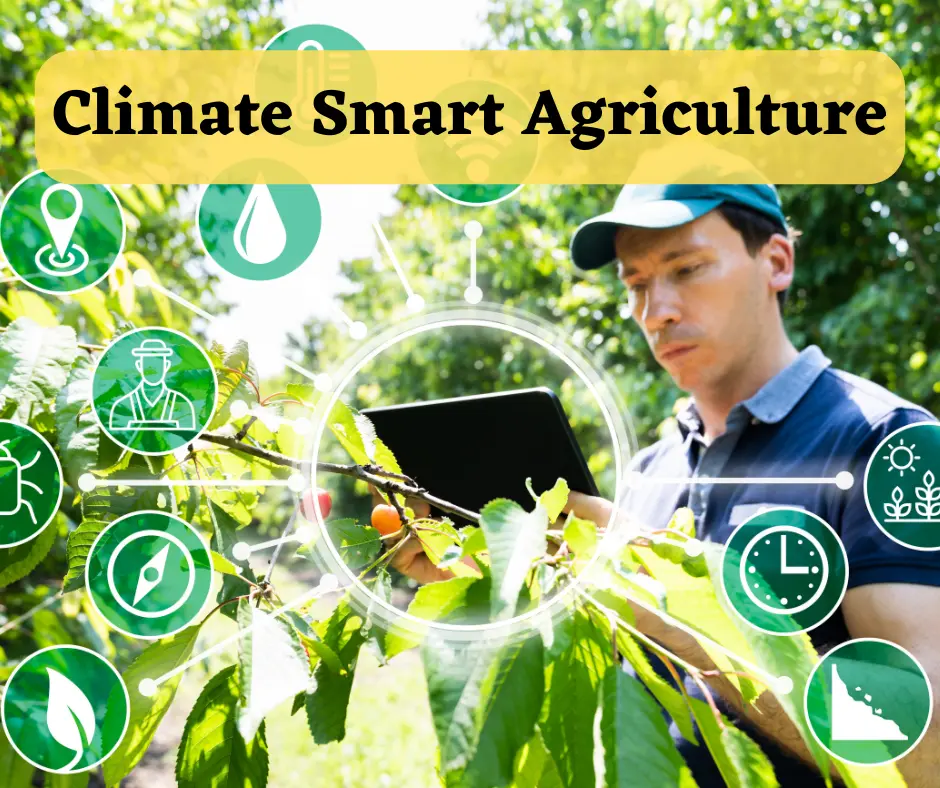Introduction:
Agriculture is the cornerstone of Pakistan’s economy, providing livelihoods for millions and significantly contributing to the GDP. However, the future of agriculture faces immense threats due to climate change. As global temperatures rise, weather patterns become unpredictable, extreme events like floods and droughts become more frequent, and traditional farming practices are under severe stress. To ensure sustainable food production and security, the Climate Smart Agriculture (CSA) concept is gaining traction. CSA integrates climate change adaptation and mitigation strategies into agricultural practices to enhance productivity and resilience and reduce greenhouse gas emissions.
Diverse Effects of Climate Change on Agriculture
Climate change holds a myriad of challenges to agriculture in Pakistan. Rising temperatures can reduce crop yields, while altered precipitation patterns can lead to water scarcity or excessive flooding. Severe weather events, such as heatwaves, floods, and droughts, can destroy crops, disrupt planting and harvesting schedules, and lead to soil degradation. Additionally, changing climatic conditions can exacerbate pest and disease pressures, further threatening crop production. These effects collectively jeopardize food security, livelihoods, and the overall strength of the agricultural sector in Pakistan.
Carbon Footprint Reduction
One of the key components of Climate Smart Agriculture is the reduction of carbon footprints in farming practices. Traditional agricultural methods rely heavily on synthetic fertilizers and fossil fuels, contributing to the emission of greenhouse gases. CSA promotes practices such as no-till farming, cover cropping, and integrated pest management, which enhance soil health and sequester carbon. Moreover, adopting renewable energy sources, such as solar-powered irrigation systems, can significantly reduce reliance on fossil fuels. By reducing emissions and enhancing carbon sequestration, CSA contributes to the worldwide efforts to mitigate climate change.
Climate-Resilient Crops
Developing and promoting climate-resilient crops is crucial for sustaining agriculture under changing climatic conditions. These crops are bred to withstand extreme weather conditions, such as drought, heat, and flooding, and are often more resistant to pests and diseases. In Pakistan, research institutions and agricultural bodies are working towards introducing wheat, rice, maize varieties, and other staples that can thrive in adverse conditions. Cultivating these resilient crops ensures stable yields, enhances food security, and reduces farmers’ vulnerability to climate-induced losses.
Adapting to Climate Change
Adaptation strategies in Climate Smart Agriculture encompass a range of practices designed to make farming systems more resilient to climate impacts. These include:
- Water Management: Implementing efficient irrigation systems like drip and sprinkler irrigation to conserve water and ensure optimal use.
- Soil Health: Promoting soil conservation techniques such as crop rotation, organic farming, and agroforestry to maintain soil fertility and structure.
- Diversification: Encouraging crop diversification and mixed farming systems to decline the risk of total crop failure and improve farm income stability.
- Early Warning Systems: Utilizing weather forecasts and early warning systems to prepare for severe weather events and minimize potential damages.
Detailed Benefits
Climate-smart agriculture offers numerous benefits:
- Increased Productivity: By adopting improved farming practices and resilient crop varieties, farmers can achieve higher and more stable yields.
- Enhanced Resilience: CSA practices help build the strength of farming systems, making them better equipped to handle climate variability and extreme events.
- Environmental Sustainability: Reduced reliance on chemical inputs, improved soil health, and enhanced carbon sequestration contribute to environmental conservation.
- Economic Stability: Diversified income sources and reduced vulnerability to climate risks improve the economic stability of farming communities.
Uses
Climate Smart Agriculture can be applied in various contexts:
- Smallholder Farms: Enhancing the productivity and resilience of small-scale farmers most vulnerable to climate change.
- Commercial Agriculture: Integrating sustainable practices in large-scale farming operations to reduce environmental impacts.
- Urban Agriculture: Promoting climate-resilient practices in urban farming initiatives to support food security in cities.
Crop Problems
Despite its benefits, CSA is not without challenges:
- Knowledge Gaps: Many farmers need more awareness and understanding of CSA practices and their benefits.
- Resource Constraints: Implementing CSA often requires access to resources such as improved seeds, technology, and financial support, which can be limited for smallholders.
- Policy Support: Effective implementation of CSA requires supportive policies and investments in research and infrastructure.
Farmers’ Problems
Farmers in Pakistan face several problems:
- Access to Technology: Little or no access to modern technology and equipment hampers the adoption of CSA practices.
- Market Access: Farmers often need help accessing markets and fair prices for their produce.
- Climate Uncertainty: Unpredictable weather patterns make it difficult for farmers to plan and organize their crops effectively.
Conclusion:
In conclusion, Climate Smart Agriculture presents a viable pathway for securing the future of agriculture in Pakistan amid the growing threats of climate change. By adopting resilient practices, reducing carbon footprints, and enhancing adaptation strategies, Pakistan can ensure sustainable food production, protect livelihoods, and contribute to global climate goals. Integrating CSA into national agricultural policies and farmer education programs will be crucial in realizing these benefits and building a resilient agricultural sector.
